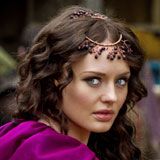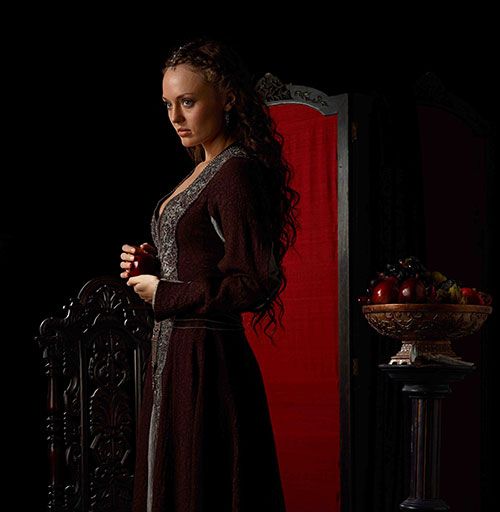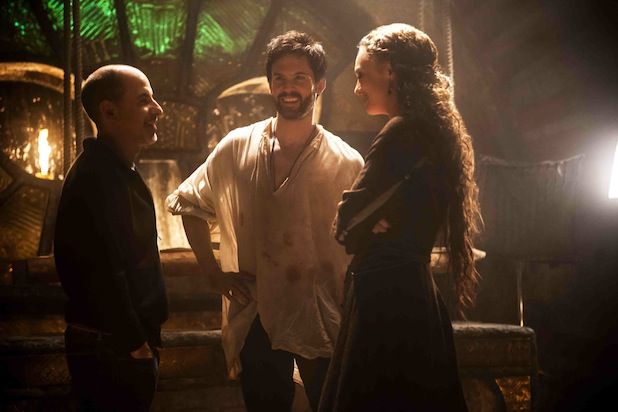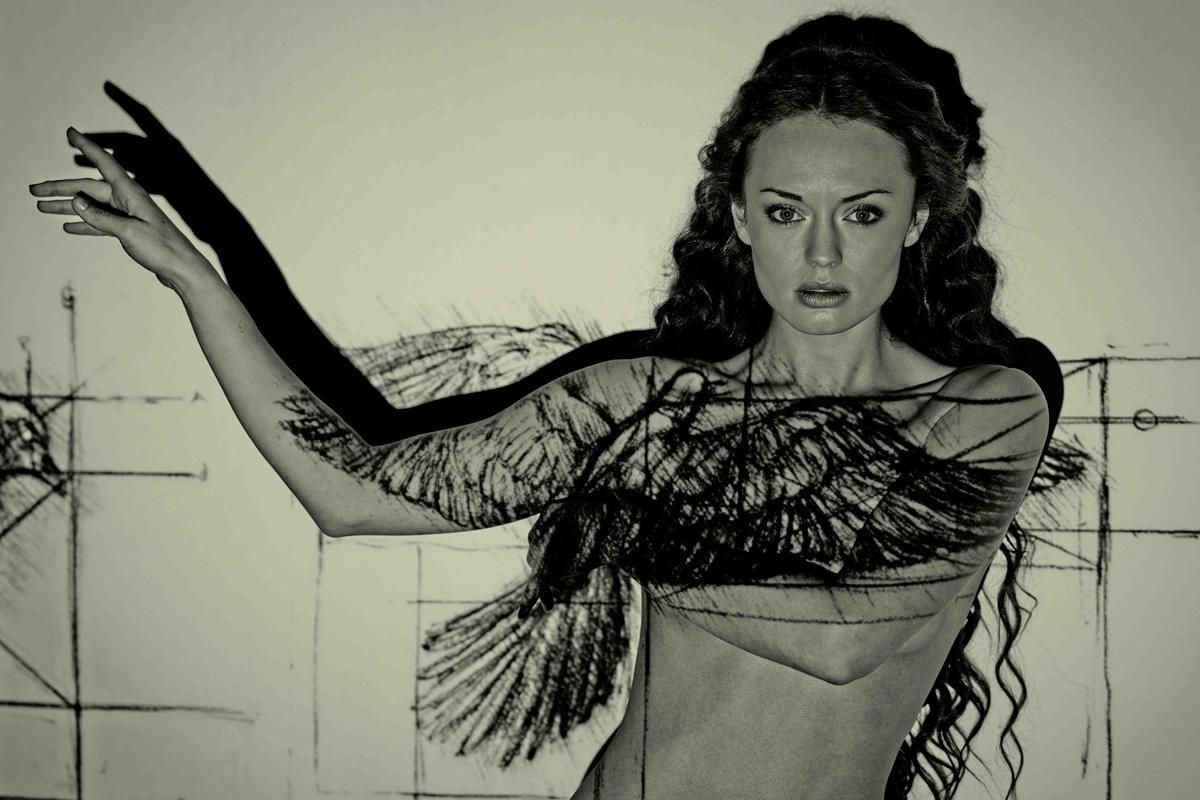As one of the stars of Da Vinci’s Demons, now in its second season, Laura Haddock plays Lucrezia Donati, a young woman who would be dismissed as little more than a beautiful mannequin, yet who has through force of will become a major player in a society that has little value for women with strength or intelligence. And Haddock, perhaps unsurprisingly, approaches the role with as much thought as the character not only demands but deserves, finding a root for Lucrezia’s complexity that flirts with more modern notions of gender roles without coming across as anachronistic.
The actress spoke with Spinoff Online right before the Season 2 premiere of Starz’s historical fantasy, and offered a few tantalizing hints at what’s coming for her character and the series. In addition to talking about how she defines – and develops – the character over the course of the season, Haddock discussed her collaboration with the show’s writers, and offered her thoughts about what she’s most excited for audiences to see as new episodes unspool.
Spinoff Online: Coming into this season, do you feel like you have a really comfortable grasp on the character, or has it continued to be a process of evolution and discovery?
Laura Haddock: It’s definitely been a constant evolution. I think that the best thing about going into Season 2 is that I got to go back in time and play Lucrezia at about 16 years old and actually physically go through what she went through at 16. That was helpful. I wasn’t just told, oh, this has happened to your character so this is why she is the way she is. I actually got to physically play that out for real, and that’s really helpful because you have an emotional memory about something and a muscle memory about something. And so I was able to take that through and to the rest of season two and have that memory which was really helpful. And also it set my mind at ease a little bit about decisions I made in Season 1. Because I wanted her to feel guilt and feel pain and I didn’t want her just to be a baddie who goes around murdering people. That’s not interesting. So I thought well, something must have happened to her in her life and David and I discussed certain ideas and maybe this could have happened or this could have happened. And what David and the team ended up coming up with was, to me, when I read it I thought that really just – not justified, but I really understand this woman so much clearer now. See who she is.
Star Tom Riley Talks Mystery, History and Leonardo's Sexuality
You said that opportunity to play her at a younger age gave you a sort of retroactive understanding of some of what the character did. How do you feel like that will be reflected in the storytelling or how you play the character going forward?
I think that to have that physical experience and that memory on set that day of witnessing what happened, and feeling it and playing it and then taking it through into the rest of the season is really helpful and really vital, actually. Because every choice now I make I have such a strong image of why I’m doing it in my head. Whereas before there was as strong image, but there’s nothing like physically experiencing something to give you a visual of what it is that you’re working for. So that was great. But there’s a great moment right at the end of Season 2 when – I don’t know what I can say, but when she gets to unload, basically. It was really great because I remember the feeling on that day, that for like maybe 10 years, I think, she’s never told anyone what’s happened, and suddenly she gets an opportunity to do so and that felt really amazing.
How responsible can you be for juggling the demands of the time period in terms of women’s roles and creating a character who’s complex and interesting and who is an equivalent to the male characters in the show?
She’s so different to any other women I know or I’ve researched of that time. I feel like before this thing happened in her life, she was a young teenager ready to become a young woman, fall in love and have her heart broken and date and be told that she was beautiful and feel how lovely that feels and have her heart wide open to life. Eyes wide open, ready to explore everything, you know, get married, be a mom, maybe work in fashion, do whatever. She could have done anything and then this thing happened, and it just instantly put a stop to all of those dreams and all of that freedom and light that was inside her. Everything became dark. Everything became tainted and so she was one person but life and the situation forced her to be another person. So this strength that she’s found, this darkness that she’s found and this kind of ruthless thing that she’s found isn’t her. It’s something that she’s learned to develop and it’s going against who she naturally is, so I always wanted to find little bits of who she naturally is and bring that into her character. But on the other hand, she is being manipulated by the Vatican and by these people who you’re not really sure [who they are] yet, but you’ll find out in season two. She’s certainly a puppet on a string. But she’s got rather a lot of strength to do the things they’re asking her to do. So she is a really strong when living in that time period.
"Da Vinci's Demons" Creator David Goyer Discusses Plotting His Hero's Journey
It seems almost like what she has to do is opposite of what you have to do as an actress, because you get to indulge the opportunity to be somebody different, whereas she’s being forced to be somebody different than maybe would be your natural inclination. Is that easy or difficult to sort of tap into?
Well, I suppose it’s both. The thing is with her is that when she meets Leonardo da Vinci, he changes everything so she didn’t realize that she had the ability to fall in love. And then she meets this guy and he opens her heart up and she realizes that she has the ability to love someone. And she has this really strong desire to be loved, but she can’t ever fully open up to him. She can’t tell him the truth. She won’t let herself tell him the truth. So she can’t ever fully be herself with him. She’s still feeling real feelings of love, which are the most real, most honest feelings anybody can have. But she’s not able to display them in an honest way. So she is constantly battling with what she’s feeling and what she’s saying. Which is really, really hard.
It sounds like it.
But I think the most important lesson for her in season one was actually to realize that she was capable of love. Because I don’t think she was – I think she thought that that had been cut off, like that had been stripped from her.
Well, how reliant do you need to be on anything other than the scripts of the show at this point?
David [Goyer, the series creator] and the writing team give you so much in the scripts that in the beginning I was trying to decide who this woman was and who she reminded me of. And then I decided to stop doing that because there were too many people involved. Lucrezia has so many different faces and different sides and she’s so kind of multidimensional that I just had to stick with what the writers gave me and trust that because it’s all there. And she kind of explores all these different relationships with all these different people and you see all these different sides. So I just kind of honored each one, each moment.
David Goyer on Giving Audiences "What They Don't Even Know They Want"
Does real historical context feed your preparation?
She existed. She was there. She was living at the time and she was certainly a celebrated beauty of Florence. We don’t know if she had affairs with da Vinci or Medici, but we can take some liberties there. She probably would have been the kind of person that Lorenzo would have had as a mistress.
Do you have to research any of the actual history of this time period in order to understand your character, or does the script do most of the work for you?
I think for Tom or Elliot or Blake even, I think researching the time was something that they really, really needed and wanted to do. But there wasn’t very much about my character and a lot of it is from David’s imagination. So either I would sit down with David and have a massive conversation about this woman, who he thought she was and where she was going, or I would just refer to the text because there was just so much there. I did do some research into the Vatican and into women living in that time in the Renaissance era. I did kind of look into that, but she was such an anomaly. She was so different to anybody else who was living at that time, predominantly because she had so many secrets. So I always feel weird saying I didn’t do that much research, but I did what I felt like was important and then just read the script.
How careful do you have to be about being too forward thinking about making her a very progressive female character in a time period when women were not really empowered or allowed to be that way?
I kind of don’t see her as a typical woman though living in that time. She’s not conforming to any status or she’s not conforming to any rules about what it is to be a woman living in the Renaissance era. She’s completely different from, Clarice, say, who comes with a title and money and loyalty and morals. She’s married to Lorenzo Medici. She is part of a family who come with their own heritage and their own money. She’s a mother. And Hera, who plays Vanessa – Vanessa was a nun but is now living kind of a very bohemian lifestyle and she’s making her own decisions. And she’d rather be kind of skipping through the markets than confined to conforming to being a wife or whatever. Lucrezia is not either of those women. A lot of the time she’s living her life like a man – and she’s in hiding a lot. She has to be inconspicuous. She has to be incognito a lot. She’s spinning a whole web of lies about who she is. It’s all a façade. She’s been told to get married. She’s been told to wander around the markets in Florence and look beautiful and have women look at her and see her dress or see her hat or see her shoes and long to be like this walking mannequin, in quotation marks – so she’s this kind of mannequin on the outside, but there’s so much pain inside.
How quickly did you realize that this character was not going to be that mannequin, but was going to be this person who is very tormented on the inside?
The first time she probably killed someone. I go, right, okay, this isn’t just your run of the mill beautiful woman, swanning around in a Renaissance show. She’s got something going on here. There’s something darker and she’s like a complete juxtaposition of power and weakness. She’s been completely broken by what’s happened to her in her life, but it’s having to manifest this unbelievable strength. And that was interesting to me, that where do you find strength from when everything inside you is so weak? What do you do? You find strength in your hand when you’re being told to murder someone. So you use your hand to stop them, but your heart breaks as you do it. So that was always very interesting to me that she was able to commit the crime but she felt humongous guilt.
What ultimately in Season 2 are you maybe most eager for audiences to get a chance to see?
I can’t wait for audiences to see her back when she was younger and to see like the light, happy Lucrezia. And then I can’t wait for them to see what happened in her life. And it’d be really interesting to see whether or not the audience goes with her then and realizes that everything that she’s doing is because of this thing that happens and she’s desperately trying to avenge this thing, this circumstance. I’d just like to see whether or not the audience thinks it’s worth it. Because I do. I mean, I don’t think that she should be going around doing the things that she’s doing, and it doesn’t completely justify what she’s doing, but there’s method in her madness.
Da Vinci’s Demons airs Saturdays at 9 p.m. ET/PT on Starz.




